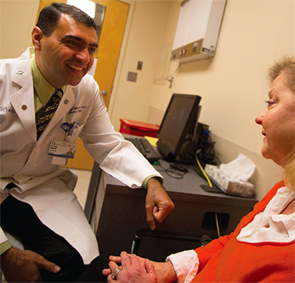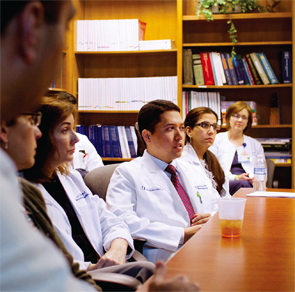
Vikas Majithia, MD, MPH, chats with a patient.
As the rheumatology fellowship program director at the University of Mississippi Medical Center in Jackson, Miss., Vikas Majithia, MD, MPH, trains the next generation of rheumatologists. With the help of funding from the Rheumatology Research Foundation, he has not only expanded the training spots for rheumatology fellows at his institution, he also provides patients with more experienced rheumatologists.
Dr. Majithia has received the Foundation’s Amgen Fellowship Training Award four times since 2010. The award provides funding to an institution to support the salary of a rheumatologist-in-training. The goal is to ensure a more robust and highly trained workforce is available to provide clinical care to people with rheumatic diseases. Dr. Majithia says the award has been very beneficial for his program, especially during a time when medical funding across the country is limited. “This award has been a great anchor to ensure that we fulfill our commitment to the fellowship,” he explains. “Obtaining the award over the years has provided us with significant financial security to continue to provide training.” During Dr. Majithia’s time at the University of Mississippi, the rheumatology fellowship training program has gone from one new fellow per year to two.

Dr. Majithia meets with his rheumatology fellows.
Dr. Majithia notes, “The investments that the Foundation makes into rheumatology programs directly impact patient lives by increasing the number of people who are available to take care of those patients.” Some people in need of treatment are already seeing the results of Dr. Majithia’s work and Foundation awards. A former trainee, Kirk Eddleman, MD, is currently practicing in Oxford, Miss., fulfilling a decade-long, unmet need for rheumatology care in rural central Mississippi. Similarly, Janie Bruce, MD, is treating patients in South Carolina, a state identified by the Foundation as an area where many patients in need of rheumatology services do not have access to rheumatologists.
According to Dr. Majithia, the Foundation’s Amgen Fellowship Training Award has become an important tool for providing valuable education for future rheumatologists who will be more equipped to treat the growing patient population. He believes the award will help his university expand the training it offers to better meet the needs of people with rheumatic diseases.



